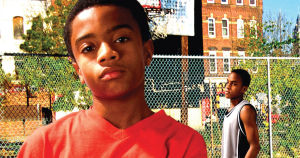
Review: Chime by Franny Billingsley
In no way is Briony’s depression the whole point of this novel—however, it is an important piece, and it is portrayed excellently. Chime was one of the most cathartic reading experiences of my life.

In no way is Briony’s depression the whole point of this novel—however, it is an important piece, and it is portrayed excellently. Chime was one of the most cathartic reading experiences of my life.

Pete’s autism is portrayed over and over again as being non-stop pain and suffering. That got incredibly hard to read; do people really think this is what autism is like?

The story suggests that Kira’s talents as a threader make up for her disability, justifying her continued survival–with the disturbing implication that without it, she would be worthless.

Kinda Like Brothers is a pacey, touching look at foster care from an adolescent perspective, featuring an accurate and relatable look at asthma.

Although Laureth didn’t represent me as a blind person, Sedgwick didn’t feed off tropes and stereotypes; instead, he met with many young blind people and found out about their lives.

Everything, Everything starts out as a respectful, sensitive narrative with incredibly likable characters, but ends on a shockingly disappointing note in terms of disability representation.

s.e. smith’s rave review of Wild Awake was one of the very first posts on this blog. We invited s.e. and author Hilary T. Smith to discuss books, mental illness, and everything in between.

Although the book was fun and interesting in places, the disability aspect was very much a freak-show presentation of disability and the disabled experience.

Our reviewers interview author and Disability in Kidlit editor Corinne Duyvis about disability tropes, survival in the apocalypse, and writerly research.

If you looked at me as a teenager, particularly during my freshman year in high school, I would not have stood out from my peers. If you looked closer at my dominant right hand, though, you’d see there was a significant problem.